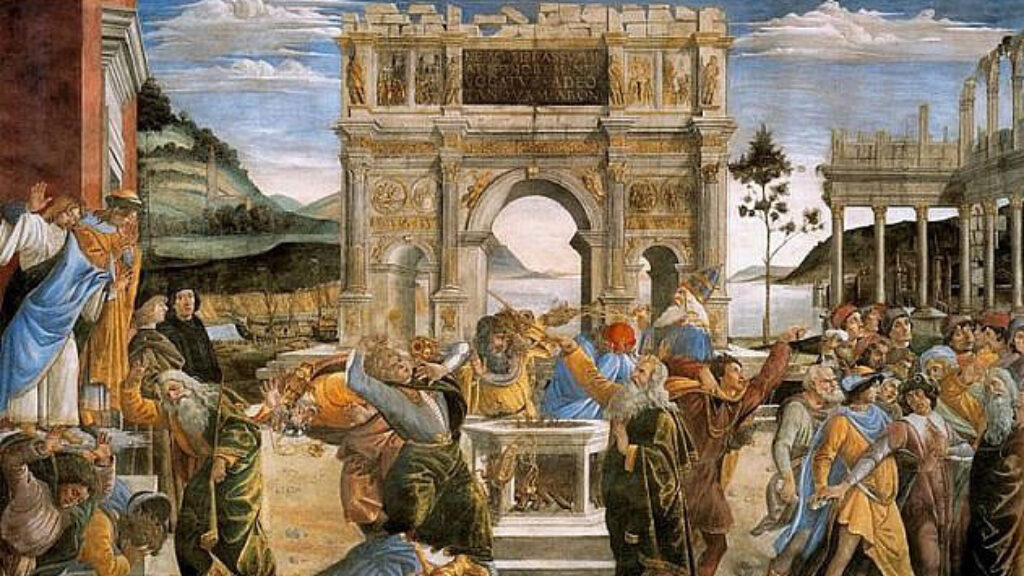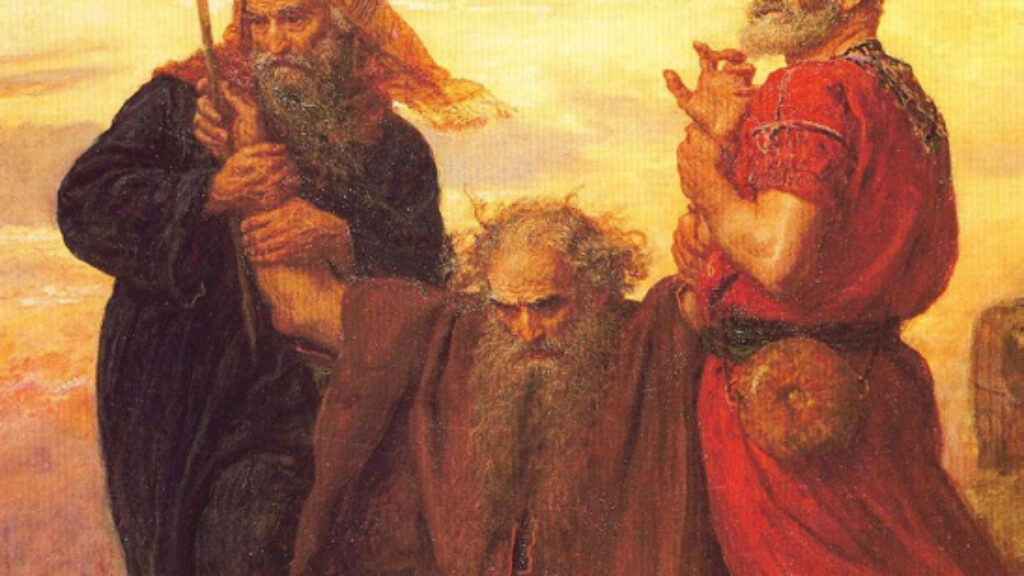An American Jewish Folk Hero
A striking fact about modern Zionism is that its founder, Theodor Herzl, dedicated his life to Jewish statehood despite originally caring little for Jewishness. At one point, he even advocated that Jews be baptized; he also placed a Christmas tree in his Vienna home.
The story of another Jewish hero, Major League Baseball (MLB) player Hank Greenberg, is even more strange. Like Herzl, Greenberg had shed much of his Jewish identity as a young man. Also like Herzl, Greenberg changed, at least for a moment. In famously refusing to play in a 1934 game scheduled on Yom Kippur, Greenberg made a consequential mark on American-Jewish life, and was subsequently transformed into a Jewish folk hero.
Unlike Herzl—whose embrace of Judaism remained with him til death—Greenberg resumed his life after that Yom Kippur game as if nothing had happened. The fact that he put his career on the line for his faith and became a legend to American Jews rolled right off his shoulders. To Greenberg, it was no big deal.
The story of this unlikely Jewish paragon is the subject of Mark Kurlansky’s 2011 book, Hank Greenberg: The Hero Who Didn’t Want to Be One. It begins by stating what many baseball fans already know about Hank Greenberg, that “he was a baseball player who hit a lot of home runs before most of us were born.” Indeed, had that been all there was to his career, he would be remembered together with the other baseball stars of his era: Jimmie Foxx, Bill Dickey, Al Simmons, Charlie Geheringer. But while the others perpetuate their memories merely as holders of statistical records or as expensive baseball cards, Greenberg’s legacy means something more to generations of Jewish baseball fans. To them, the Hammerin’ Hank lives on.
Hank Greenberg was born to Orthodox Jewish immigrants from Romania. Growing up in the Bronx, the household moved to the beat of the Jewish calendar: the Sabbath, holidays, and a kosher kitchen. Greenberg, a towering figure at six feet and four inches, excelled at both baseball and basketball at James Monroe High School. His parents, as was typical of the Eastern European immigrant stock, were displeased with his focus on sports and neglect of his studies. But the thoroughly Americanized Hank rebuffed parental instructions and spent most of his free time at the Y playing basketball, or in nearby Cortona Park hitting baseballs. It was there, in the grassy yards of Cortona, where Hank began the journey to becoming the Hebrew Hammer. Hour after hour, day after day, Greenberg worked on the swing that was to electrify a country.
Greenberg’s parents never embraced the idea of “their son the ballplayer,” but they stopped actively opposing Hank’s athletic pursuits when it became clear just how good he was at baseball. At only 18, the New York Yankees were already recruiting him. Greenberg declined because he did not want to be stuck on the bench as a backup to Yankees’ star first baseman (and future Hall of Famer) Lou Gehrig. Instead, Greenberg decided that he would go to college and play baseball for New York University, a decision his parents surely endorsed. After a year, he signed with the Detroit Tigers for $9,000 ($130,000 today).
Greenberg started his career in the minor leagues, and his superb hitting stood out at baseball diamonds across the country. Despite this, Greenberg was a frequent target of anti-semitic slurs. On one occasion, an opposing player kept shouting an anti-semitic epithet from the dugout. Greenberg immediately ran to the dugout to fight the man. Faced with the sight of the 6’4 Greenberg, the player backed down. Hank would use this fearless move in the majors too, when anti-Jewish taunting became intolerable. These were the early signs of a principled man who would confront any challenge head on, whether on the diamond or, later, in battlefields.
Determined to stay true to his convictions and identity, Greenberg refused to change his last name to obscure his Jewishness, as many other Jewish athletes had done. Even as his rising profile led to more anti-semitic vitriol, Hank would not let the haters win.
However, these rare Jewish moments were indeed rare. After leaving the Bronx, Greenberg shed almost all of the remaining traces of his Jewish life. To him, baseball came first and anything else was a distraction. If not for the anti-semites harassing him, there would be little to remind Greenberg of his faith.
Greenberg was called up for his first full season with the Tigers in 1933, where he hit .301 and 85 RBIs, a great entry to the MLB. The next season, Greenberg would dominate all statistical categories, leading the Tigers to the top of the American League. In a heated race for the 1934 pennant, Detroit fans saw the glimmer of their first World Series appearance in 25 years. The standings were tight and the Tigers had a crucial game against the Boston Red Sox. That day was Rosh Hashanah, the Jewish New Year. Word leaked that Greenberg was considering skipping the game to honor the holy day. Detroit fans desperately urged him to play as the game was too important in their quest to reach the World Series. But Greenberg was torn. The Jews of Detroit saw the slugger as “their guy” who “both Jews and non-Jews were beginning to see him as a kind of national Jew.” Nationwide, Jews hoped Greenberg would show how to be a proud Jew in American society. However, no one knew what was in his head: the question of whether he would play was ceaselessly debated. There was radio silence from Greenberg’s end, even as the “press, especially in Detroit… worked every angle of this Rosh Hashanah story” to try to convince Greenberg to talk.
The only talking he was doing was with a leading Detroit Reform rabbi, Leo Franklin, with whom he had formed a good relationship. Franklin appealed to Greenberg’s deep attachment to classic American ideals, arguing that Greenberg’s decision rested “on the doctrine of personal responsibility.” In the end, Greenberg suited up and played on Rosh Hashanah, but an even bigger holiday, 11 days later, would test his moral strength once again.
The Tigers faced the Yankees on September 19th. That day was Yom Kippur.
Rumors soon spread that Greenberg was considering skipping the game to attend synagogue services. In consultation with Rabbi Franklin, Greenberg finally decided to follow his faith and his people. He did not play and attended synagogue in Detroit. Of course, his decision was not well received by some Tigers supporters, but in the end Greenberg earned respect from baseball fans. The Jewish community responded with immense gratitude.
Though already a star, Greenberg was only in his second season in 1934 when he made his fateful decision. He had a lot to lose by refusing to play when it mattered most.
By 1940, Hank Greenberg was the best hitter in the MLB. He had won a few World Series, two Most Valuable Player awards, and was named an All-Star every year since 1934. As America geared up for war, Greenberg had another career-transforming decision to make, and choose to act as a true leader. He became the first baseball player to register for the peacetime draft and served for 47 months, the longest of any MLB player. When asked about his World War II service, which included overseas experience, Greenberg said that it was his duty as an American, not as a Jew. As Kurilansky put it, “[h]e was going in to serve his country, not necessarily to fight the Nazis, as the Jewish version would have it. The son of immigrants, he was more passionate, or at least he found it easier to express passion, for being American than for being Jewish.” Nevertheless, yet again Greenberg’s commitment to his principles triumphed over career goals. Greenberg was a patriotic American who believed in its ideals, including religious liberty and opportunity for all.
His decisions to put the greater good above his career places Greenberg in the tradition of Jews who stand for what they believe in against outside pressures. As the book of Deuteronomy says: “Be strong and courageous. Do not be afraid or terrified because of them, for the Lord your God goes with you; he will never leave you nor forsake you.” Greenberg understood that his decision would be appreciated by one group and frowned upon by another, no matter what he did. However, he understood his place in the world as a Jewish athlete who people look up to. He understood that, in order to please both baseball fans and the Jewish populace, he had to make compromises.
After World War II, Hank Greenberg returned to the MLB, but was never the same baseball player. Greenberg felt sluggish while playing, and he knew his baseball days were coming to a close. Greenberg’s contract was transferred to the Pittsburgh Pirates and he only lasted one season there before retiring. Afterward, Greenberg became an executive with the Cleveland Indians, and then retired to Los Angeles for his remaining years. Hank was elected to the Baseball Hall of Fame in 1956.
Greenberg’s amazing life and career can still inspire today. Society today has much to learn from a man who did what was right for its own sake, seeking no recognition or acclaim. Hank Greenberg is a Jewish and American hero, although he never wanted to be one. As Kurlansky put it: “Hank Greenberg showed a humanity and strength of character far beyond that of most sports heroes.” Beyond his towering stature and ferocious swing, Greenberg ought to be—and is—remembered for his unrelenting courage, moral rectitude, and the strength he exerted on and off the field.
Suggested Reading

Tal-Or Cohen Montemayor on the Surge in Online Anti-Semitism and Its National Security Implications
BY ESTHER LUVISHIS Social media is a significant part of everyone’s life in the twenty-first century, especially for the young. From X, formerly Twitter, to Instagram and Facebook, there is…

Legendary Jewish Wisdom and Artificial Intelligence
BY MARC DWECK In the shadowy alleys of sixteenth-century Prague, Rabbi Judah Loew ben Bezalel, known as the Maharal, crafted a colossal figure from the clay of the Vltava River.

Korahite Judicial Philosophy
BY JACOB SHAYEFAR Korah makes an interesting point. As the Midrash relates, Korah began his assault on the authority of Moses with a halakhic argument. He asserts that in any…

The Six Elements of Resilience Inherent in the Jewish Tradition
BY RAANAN VANDERWALDE There is no denying that Jews are resilient. Judaism is one of the oldest religions in the world. For over 3,000 years, Jews have been persecuted, killed,…